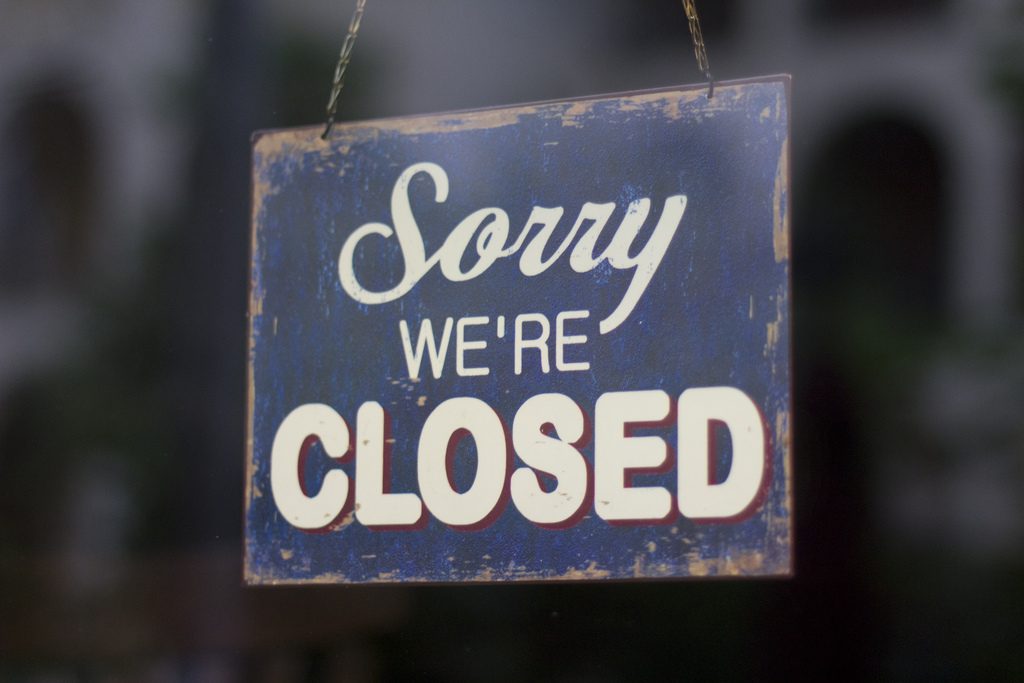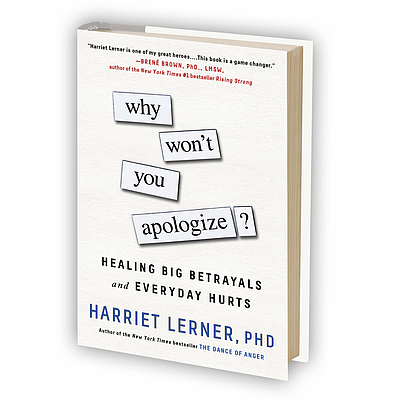Is Saying “Sorry” Really All It Takes?: An Interview with Dr. Lerner, Ph.D.


If you find yourself in situations where tensions arise and an apology is expected, you should remain cautious when it comes to receiving one. Many people find themselves in a conflict where a) they don’t know when an apology is completely sincere, and/or b) they don’t know how to give a genuine apology. A few weeks ago, I came across an article: “The Five Best Ways to Ruin an Apology”, this really informed me on how damaging blame-reversing apologies can be. In order to go more in depth with this topic, I had the pleasure of interviewing Dr. Lerner, a clinical psychologist who is best known for her research on family relationships and the psychology of women. While psychotherapy remains as the importance of her practice, Dr. Lerner continues to apply theories on family systems and feminism to her writing.
Below, Dr. Lerner was able to discuss the importance of identifying the issues associated with a blame-reversing apology and how this form of apology can be far more harmful than good. If you would like more information on how to decode the signs of a blame-reversing apology, I recommend reading Dr.Lerner’s article: “The Five Best Ways to Ruin an Apology (De-code the 5 signs of a relationship-busting apology in love and work)”
https://www.psychologytoday.com/blog/the-dance-connection/201705/the-five-best-ways-ruin-apology
Your article is very informative and I wanted to expand this discussion to our audience. I noticed you specialize in family/intimate relationships, what inspired you to study relationships and/or the psychology of women within the field of mental health?
Nothing is more important than our relationships, and relationships are never easy. Even the best relationships get stuck in too much distance, intensity, and pain. The thread that unites all of my books is my desire to teach people to navigate the swamps and quicksands of difficult relationships with clarity, courage, and joyous conviction. I’ve always had a special interest in helping women to move from ineffective complaining to assertive claiming., and to strengthen both the self and the relationship without losing either.
In your article, “The Five Best Ways to Ruin an Apology”, you discuss how blame-reversing apologies actually deepen the wound and raise the conflict between parties. Do you mind elaborating more on how blame-reversing can actually inflict more pain than good?
We all unwittingly hurt others and are hurt by them so the need to give and receive apologies is with until our very last breath. The words “I’m sorry,” are the most important words in the English language. But while a good apology is deeply healing, an absent or bad or blame-reversing apology can put a crack in the very foundation of a relationship or even end it. A blame reversing apology does more harm than good because it just deepens the original injury. It subtly implies that the hurt or angry person is to blame. (I’m sorry that you were upset by the comment I made at the party. I forgot that your weight is such a sensitive issue for you.” ). The hidden message is that the hurt party’s “oversensitivity” is the real problem here.
What are some signs to know when someone is using blame-reversing tactics as an apology?
Sometimes it’s easy to identify a blame-reversing apology. At the airport the other day I saw a mother hitting a small crying child. She said to him, “I’m so sorry that you make me do this to you.” Often, however, it’s difficult to decode a sleazy or blame-reversing apology. For example, when the word “but” is tagged on to an apology it undoes the sincerity and may shift the blame to the hurt party. (“I’m sorry I was rude, but you provoked me.”). And any apology that focuses on the other person’s feelings and reactions (“I’m sorry that you were upset by my comment) signal that the wrongdoer is not taking clear, direct responsibility for what he or she has said or done.
How important is a sincere apology to our well-being (even if you’re the individual giving the apology)?
When we receive a heartfelt apology we feel safe and soothed in the relationship. We know that the other person cares about our feelings and will do what they can to set things right. The heartfelt apology is not just a gift that we give to others. It is also a gift to the self. We grow in dignity, maturity, and self-worth when we can accept responsibility for our mistakes and apologize without a hint of excuse making or evasion, even if the other person can’t do the same. Sure we may be convinced that we’re only 37% to blame, but we can save our different perspective for a future conversation where it can be a subject of conversation and not a defense strategy.
The ability to offer a heartfelt apology also earns us respect in the eyes of others, even when we fear the opposite. The courage to apologize, and the wisdom and clarity to do so wisely and well, is at the heart of effective leadership, marriage, parenting, friendship, personal integrity and what we call love.
What are some ways people can give an honest/respectful apology?
A good apology includes the words “I’m sorry” without “ifs,” “buts,” or any manner of undoing, obfuscations and the like. Then there’s the matter of what you’re apologizing for because it’s one thing to forget to return your neighbor’s Tupperware and another to sleep with her husband.
Big betrayals call for an apology that’s a long distance run. It’s not the words “I’m sorry” that allow the person we’ve hurt to feel safe and soothed in the relationship again. More than anything, the hurt party wants us to listen carefully to their feelings, to validate their reality, to feel genuine regret and remorse, to carry some of the pain we’ve caused, and to make reparations as needed. They want us to really “get it.” These means we need to drop the defensiveness and listen to the hurt party’s anger and pain on more than one occasion. We need also to ensure that there will be no repeat performance.
Because some people tend to over-think or avoid confrontation (delayed reaction), how can someone act in response to an apology that they know doesn’t seem quite sincere or forgiving?
Often we feel so relieved to hear the words, “I’m sorry” that we don’t register until much later that we still feel upset. When this happens we may need to re-open the conversation and speak up. (“I felt that your apology was just a quick way out of our conversation. I need you to really listen to what I’m trying to tell you, so let’s try to talk again. I’ll calm down and talk to you with respect, and I hope you’ll do your best to listen”).
What do you predict will influence further research on psychological studies associated with networks of relationships (family/workplace/intimate)?
I have researched the subject of how apologies hurt and heal over many years. Over past generations and into the future, relationships will get into trouble in predictable patterned ways. Humans are wired for defensiveness and for blaming others. The higher the level of chronic, underground anxiety and stress in any system (families, work systems, nations), the more empathy, cooperation, and problem-solving go South. We don’t need breakthroughs. We all need to gather our motivation and courage to be our best self even when the other person is being a big jerk.
If any, what are some challenges you’ve faced during the times of your research? How have those challenges empowered you to carry out yours?
Understanding how relationships get stuck and helping people to get unstuck has been the subject of my research since the beginning of my career as a clinical psychologist. The biggest challenge is in practicing what I teach. For example, when I’m being criticized by someone who wants an apology, it’s hard for me to drop the defensiveness and listen only to try to understand the essence of what the other person is trying to tell me. Yet I know from my research, that my apology, no matter how sincere, will not heal a broken connection I have haven’t listed well to the hurt parties anger and pain.
I’ve noticed that your book, ‘Why Won’t You Apologize?: Healing Big Betrayals and Everyday Hurts’ has gained enormous praise, including in the area of self-help. Can you touch a bit on what your book covers? What do you hope readers will take from reading your book?
I want readers to learn why the simple apology really matters, and what steps we need to take when the hurt we have inflicted or received is far from simple. I also share insights about the secret life of the non-apologizer. There’s a lot to learn in the book about how to get the apology we want—and also why we may never get the apology that we long for and deserve. How can we find peace when that person who hurt and betrayed us will never get it, take responsibility, or care about our feelings?
One of my favorite chapters in the book is called “You Need to Forgive and Other Lies that Hurt You.” In keeping with the work of psychologist Janis Abrams Spring, I want to help my readers resist rushing into a false and premature forgiveness because they believe that forgiveness is the royal road to inner peace, or the only way out of a life mired down in bitterness and hate.
Here’s what’s true: You do not need to forgive in order to let go of the corrosive effects of negative emotions. And it’s not our job to encouraging others to forgive. Pushing forgiveness can traumatize the hurt party all over again. (“What your dad did to you happened a long time ago, and he was a sick man. Don’t you think it’s time that you forgive him and move on?”). It’s the last thing the injured party needs to hear. We do need to find ways to protect ourselves from the burden of carrying anger and resentment that isn’t serving us and to grab some peace of mind. We can achieve this with or without forgiveness.
 Purchase Why Won’t You Apologize? Out Now!
Purchase Why Won’t You Apologize? Out Now!
Appreciation: Many thanks to Dr. Lerner for being generous with her time and insights. Dr. Lerner and her friend Brené Brown have paired up to teach an online course called, HEARTFELT: THE POWER OF APOLOGIZING, you can learn more about it here: http://bit.ly/2jrifQg
Connect with Dr. Lerner:
Website: http://www.harrietlerner.com/
Twitter: @harrietlerner
Facebook: https://www.facebook.com/marriagerules
TEDxKC http://www.tedxkc.org/harriet-lerner/



Responses